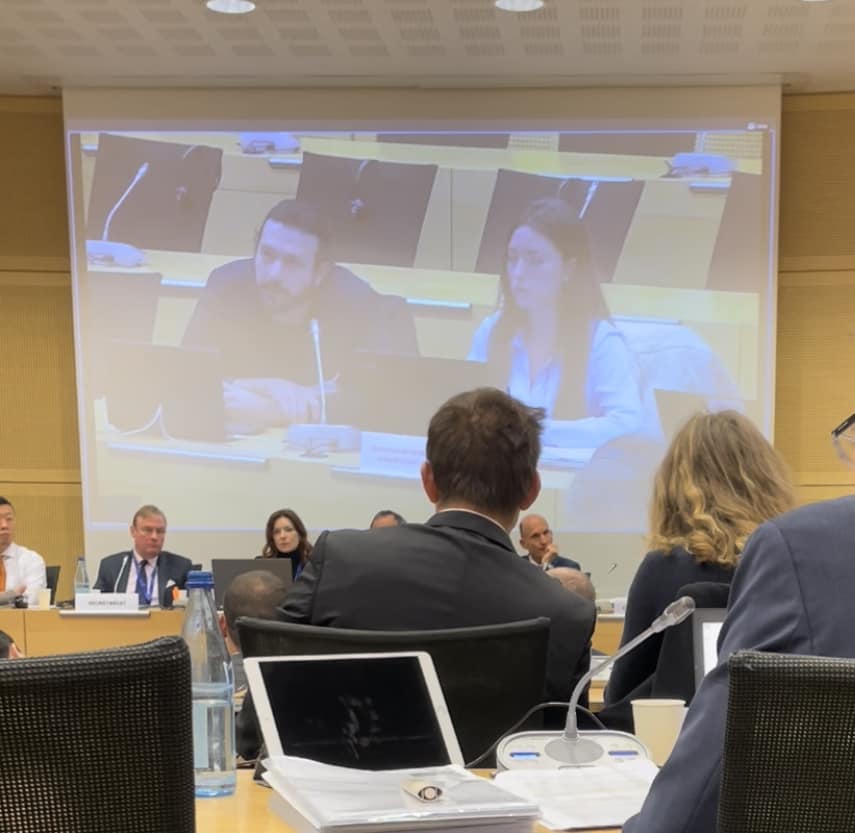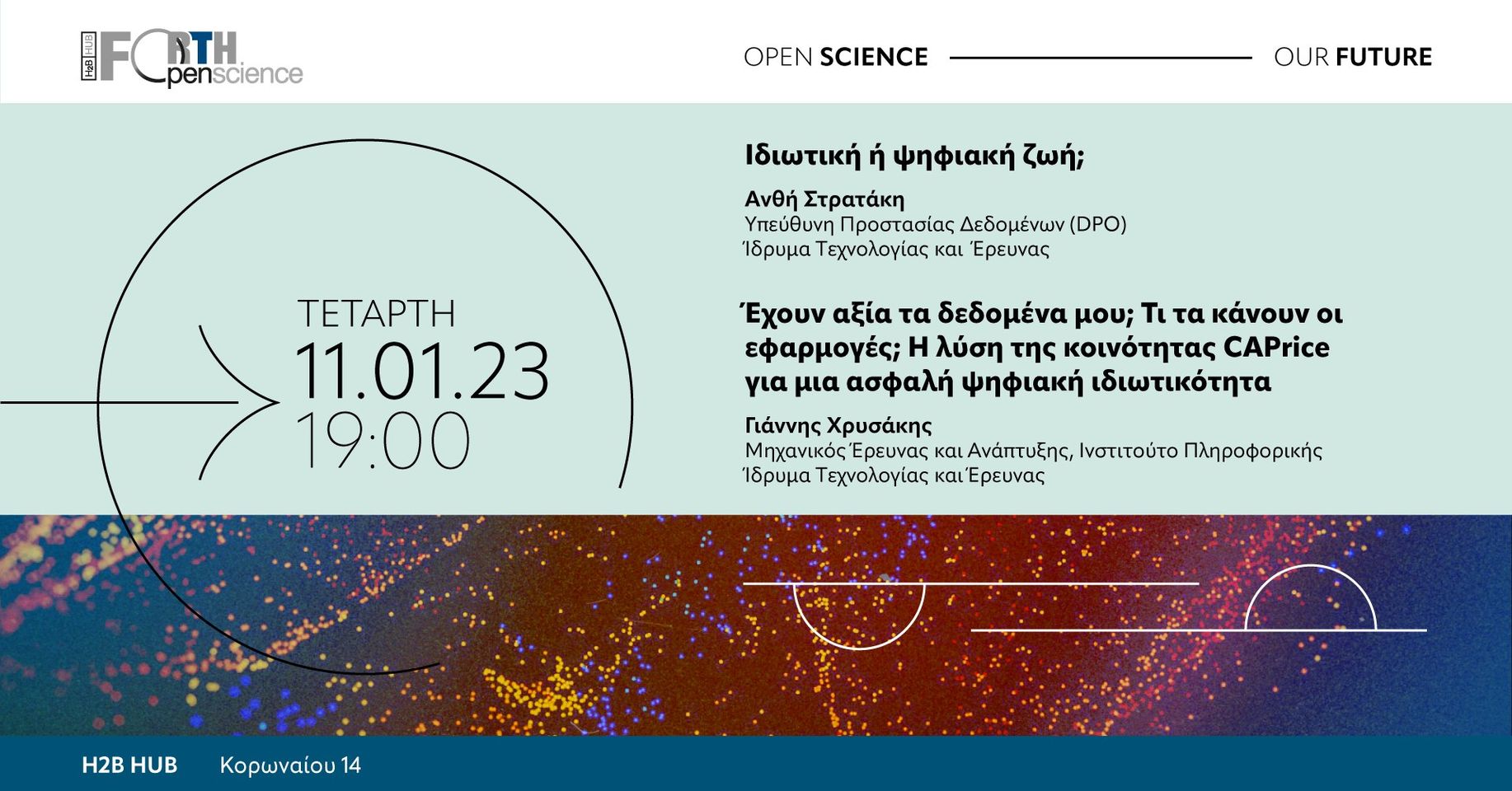Homo Digitalis celebrates Safer Internet Day with students in Larissa
Part B’
Today is Safer Internet Day and Homo Digitalis celebrated it with students all over Greece
Vassilis Vassilopoulos and Tasos Arampatzis spoke with students of the 5th and 6th grades of primary school and all the students of the Karavanas School of Gymnasium in Larissa.
There were discussions about our digital self, cyber bullying and the protection of digital rights and personal data.
Videos of the #SuperCyberKids series, created in collaboration with the (ISC)2 Hellenic Chapter and ICSI Hellas, were shown to inform them about the use of cookies on the internet.
We would like to thank the School Managements and all the teachers and lecturers for their welcome and hospitality.
The session we co-organized at the Privacy Camp for PREDATOR was successfully completed
Homo Digitalis had the pleasure of participating in the privacy camp organized by European Digital Rights in Brussels a few days ago.
Among the topics discussed were the preservation of electronic communications metadata, spyware, immigration and the use of new technologies and sex workers rights.
Of particular interest was the Workshop In spyware we trust. With new tools come new problems with speakers European Data Protection Supervisor (EDPS) Wojciech Wiewiórowski, @EU_EDPS Rebecca White Campaigner – Disrupting Surveillance Team at Amnesty Tech, Bastien Le Querrec, member of La Quadrature Du Net, and Elisa Triantafillou, journalist of inside story, who presented how she and her team uncovered the use of predator software in Greece.
Our organisation was represented by Eleftherios Chelioudakis and Elpida Vamvaka.
Many congratulations to EDRi for organizing such timely and interesting discussions.
We open our first vacancies
Following the successful application of its Board of Directors, Homo Digitalis is one of the 14 organisations that the European AI Fund has chosen to support with funding!
We are very, very happy about this huge success, as the application process and its two stages took more than 4 months with more than 140 organisations from all over Europe having applied.
You can find out more information specifically about Homo Digitalis funding here, and more information about the European AI Fund can be found here.
Homo Digitalis since its inception in 2018 and until today has been working out its activities on a voluntary basis. It is now transitioning to a new era in which it seeks to become an organisation with full and part-time staff that will reinforce its strategic and leading role, always in collaboration with its strong network of volunteers.
As part of this funding, Homo Digitalis today announces two open calls for the positions of “Manager in AI & Human Rights” and “Fundraising Manager / Charity Expert”. You can find all the information about these positions, as well as the deadlines for expressing interest, in the links below.
Manager in AI & Human Rights
Fundraising Manager / Charity Expert
Participation of Homo Digitalis in the conference "2nd IN-HOUSE LAWYERS FORUM"
Tomorrow, Tuesday 17/1, the conference “2nd IN-HOUSE LAWYERS FORUM” will be held at the Divani Caravel Hotel, in which Homo Digitalis provides sponsorship.
Elpida Vamvaka and Stefanos Vitoratos are participating as speakers analyzing key issues such as the lifting of privacy, metadata of electronic documents and the protection of personal data.
and access to them by police authorities, but also the necessary skills that an in-house lawyer must have today!
Register here.
Our participation in the third plenary session of the CAI in Strasbourg
On 11-13 January Homo Digitalis was in Strasbourg to attend the Third Plenary Session of the Council of Europe’s Committee on Artificial Intelligence (CAI), as an Observer Member.
CAI is preparing a Draft Convention, which will be the first international treaty for the development, design and use of AI systems. Its work is expected to be completed in November 2023.
Our organisation has been participating in relevant processes at the Council of Europe level since 2020, seeking to defend rights and freedoms in the context of the relevant negotiations. Our representative in the plenary session was our Board Secretary, Eleftherios Chelioudakis
You can learn more about CAI here.
Homo Digitalis participates in an online discussion on the AI Act organised by Citizen D
Online discussion on Tuesday 17 January at 15:00-16:30 by Citizen D.
The intrusion of AI into the organization of life today makes us wonder if a global regulatory framework is really needed and how it could be shaped!
Our member Chrissi Sakellari and Ana Martinović from the Share Foundation attempt to answer this question on 17 January. You can register here.
Register for the session we are co-organizing at the Privacy Camp for the use of PREDATOR in Greece
Did you register?
On 25 January, Privacy Camp takes place in Brussels, one of the most important annual meetings in the field of digital rights organised by the European Data Protection Supervisor (EDPS), European Digital Rights – EDRi, VUB – Vrije Universiteit Brussel, Privacy Salon and iee.
Together with EDRi we are co-organising a summit on the use of spyware, in which we are honoured to have as our guest the journalist Elise Triantafyllou from inside.story who was the leading reporter in the revelations about the use of Predator in Greece.
Register completely free of charge for attendance in person or online until 18/1 here.
Come and meet us at the CAPrice community event in Heraklion
Tomorrow, those of you who are in Heraklion will be able to attend the interesting discussion with our member and DPO of FORTH, Anthi Stratakis and Yannis Chrysakis, who will talk to us about the CAPrice community for a secure digital privacy.
Homo Digitalis is a partner of Caprice – Community for privacy concerns and expectations and supports its actions.
-Wednesday, 11/1/2023, at 19.00, at H2B HUB Koronaiou 14, Heraklion (3rd floor).
-Register here.
Homo Digitalis participates in Turin in a meeting of the Advisory Committee of Professor Alessandro Mantelero, holder of the Jean Monnet Chair in Mediterranean Digital Societies and Law.
On 12-13 December Homo Digitalis had the great honour and pleasure to be at the Politecnico di Torino, invited by Professor Alessandro Mantelero, holder of the Jean Monnet Chair in Mediterranean Digital Societies and Law.
On the first day we attended a workshop attended by the Presidents of the Data Protection Authorities of Tunisia and Morocco, representatives of the Italian and Catalan Data Protection Authorities, leading academics from Italy, Greece, Malta and Spain and representatives of national and international civil society organisations.
On the second day we presented our work regarding the development and use of interventional AI technologies in Greece.
It is a great honor for Homo Digitalis to be a member of the Advisory Committee in this project, and we would like to thank Professor Alessandro Mantelero and Lecturer Maria Samantha Esposito for the kind invitation and the excellent collaboration! Our team was represented by the Secretary of the Board Eleftherios Chelioudakis.
You can learn more about the event here.








